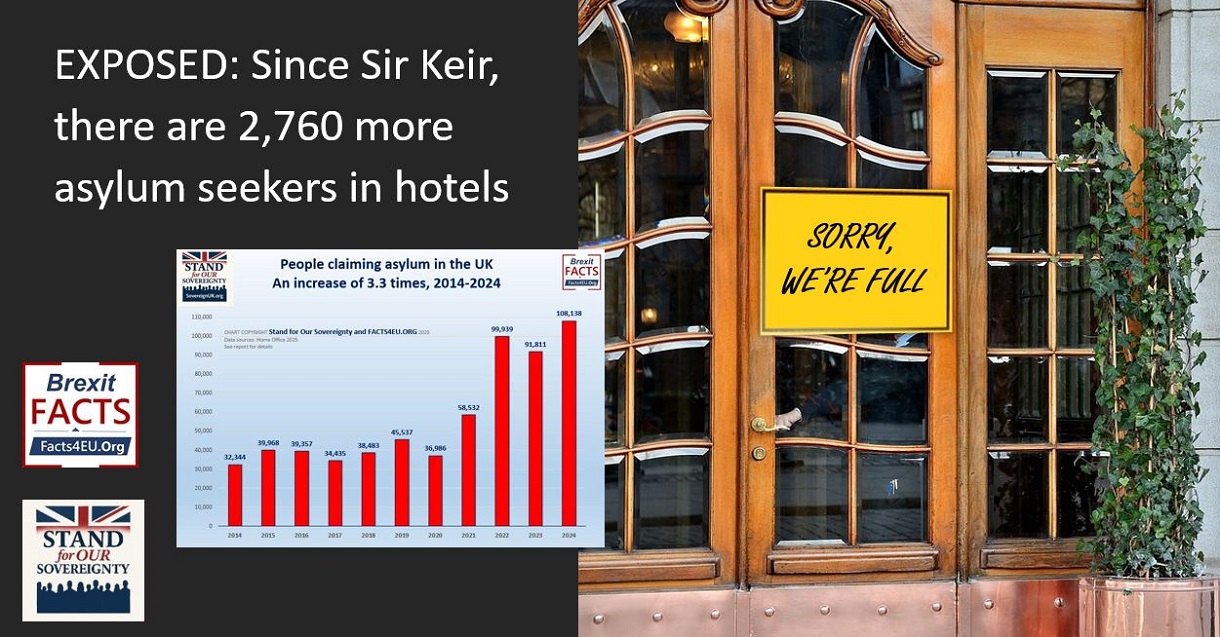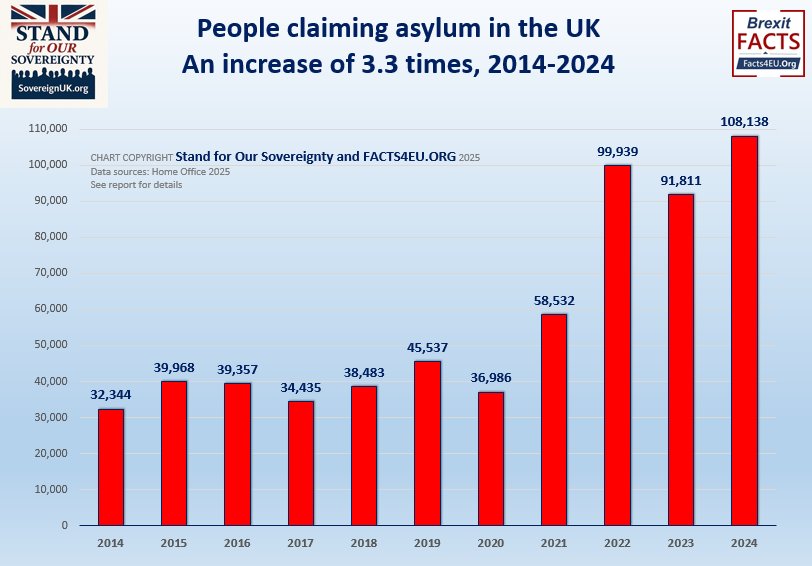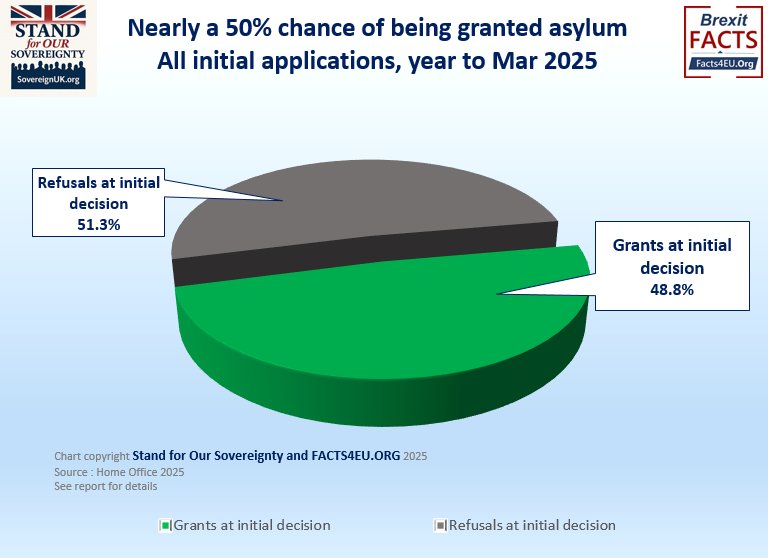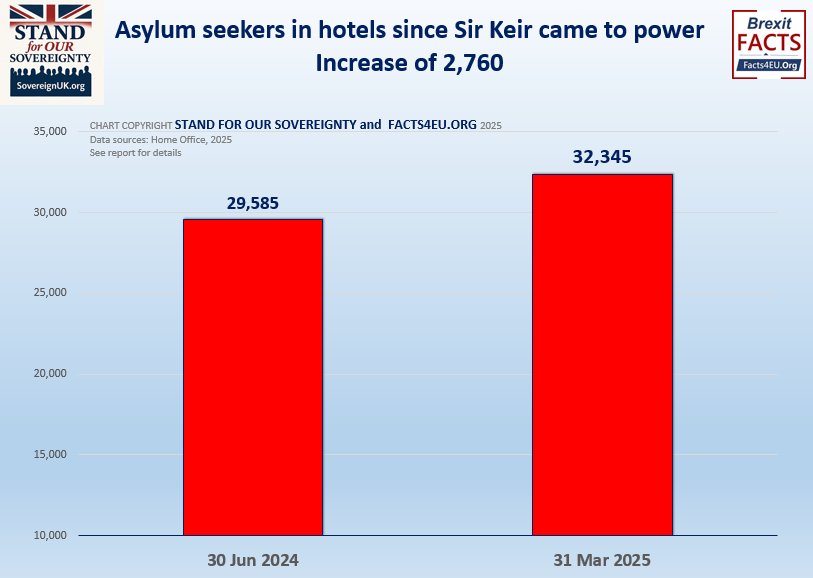Nearly 50% of all asylum seekers have been granted asylum

The number of asylum seekers has risen by 17.4% in the year to 31 March
A special 4-part report with ‘at-a-glance charts’,
showing just how soft a touch the UK really is
In all the talk about the migrant crisis, it can be easy for some parts of the media to forget to give the public the basic facts on important aspects of it. In this special four-part series for GB News, the Stand for our Sovereignty campaign team with support from the Brexit Facts4EU think-tank has gone on a deep-dive through the hundreds of spreadsheets held by the Home Office containing data of all kinds about the single topic of asylum, in order to bring the full picture to light for readers.
We asked ourselves some simple questions about asylum in the UK, and when we couldn’t immediately find the answers we set about uncovering and analysing the figures, to bring readers the information in the form of simple charts, maps, and tables, in a special 4-part report.
The questions we set out to answer in Part I of this 4-part series for GB News
[The latest time period available for all these answers was the year ending March 2025]
1. Total asylum applications from all sources of migrants
1.1 Trend over past 10 years
The first and starkest observation to make is the total number of individuals claiming asylum in the UK has more than trebled in the last 10 years. In 2014, 32,344 applications were made but in 2024 this had risen to 108,138. This has risen more than 3.3 times.

© Stand for Our Sovereignty and Brexit Facts4EU.Org 2025 – click to enlarge
[Source(s) : The Home Office ]
Comparing the latest data at the end of March 2025 to the end of March only one year earlier, we find the total number of people claiming asylum to be as follows:
- Mar 2024 : 93,150
- Mar 2025 : 109,343 (+17.4%)
1.2 Proportion of claims granted at initial decision
Year ending Mar 2025
- People receiving initial decisions : 94,135
- Grants at initial decision : 45,891 (48.75%)
- Refusals at initial decision : 48,244 (51.25%)

© Stand for Our Sovereignty and Brexit Facts4EU.Org 2025 – click to enlarge
[Source(s) : The Home Office ]
Broadly speaking, asylum seekers have a roughly 50% chance of their claim being granted.
1.3 The chances of being successful at appeal against refusal
For reasons best known to the Home Office, the last data they are able to provide on appeals is at the end of 2022. At that time therewas a 51.5% chance of an appeal being successful.
2. Asylum seekers and the support they receive
2.1 Accommodation or subsistence only
- Accommodation and subsistence : 103,684 (97.1%)
- Subsistence only : 3,087 (2.9%)
- Grand Total : 106,771
2.2 Hotels and other accommodation
- Various accommodation options (non-hotel) : 71,339
- Staying in hotels : 32,345 (31.2%)
2.3 Asylum seekers in hotels since Sir Keir came to power
- 30 Jun 2024 : 29,585
- 30 Sep 2024 : 35,651
- 31 Dec 2024 : 38,079
- 31 Mar 2025 : 32,345 (increase of 2,760 extra migrants in hotels since Labour came to power)

© Stand for Our Sovereignty and Brexit Facts4EU.Org 2025 – click to enlarge
[Source(s) : The Home Office ]
It seems highly likely, given the number of extra illegal migrants who have arrived since 31 March, that the number being housed in hotels is now significantly higher, but we will not know by how many until the Home Office publishes its data up to the end of June.
Join us here – UK sovereignty needs you!
– very much welcomed – in addition to or instead of the above
(One-off donations go through CIBUK but it goes to Stand for Our Sovereignty)
Membership will of course give you other benefits, which we will be outlining here as soon as possible. If you can’t afford to give us anything to help fund the work, you can still write to tell us you support the campaign here.
Big-hitter who believes in sovereignty and wants to see their donation make a real difference?
If you are a potential large donor, then please contact our Chairman here.
All monies are handled by CIBUK, the oldest-established organisation for independence, sovereignty, democracy and freedom in the UK, having been founded in 1969. We trust this will give everyone confidence that their money will be managed properly and spent effectively.
Independent report after independent report criticises the Home Office
In assembling this series on asylum, it rapidly becomes clear that the problems our colleagues at Brexit Facts4EU have had for years in analysing Home Office data are not confined to them – or us. The sheer number of spreadsheets in existence are surprising and all-in-all it suggests a lack of control. This is borne out by the latest independent government Inspector’s report.
Last October the first report from the new ‘Independent Chief Inspector of Borders and Immigration’ (ICIBI) was finally published. As usual the publication was delayed for many months by the Home Office.
The new Chief Inspector’s report is only slightly less damning than his predecessor’s. In short, the new Chief Inspector had very little positive to say about the Home Office’s management of the migrant crisis affecting the whole country.
Some excerpts from the 115-page report

“In most cases, the underlying issues, such as poor or non-existent data, are not unique to contingency asylum accommodation and have featured in many previous inspection reports. In the case of assurance checks, previous recommendations have not been implemented. Aside from not holding the accommodation providers effectively to account, this means that “service users” have widely differing experiences of contingency asylum accommodation.”
Value for money for the taxpayer is still a dream
Most readers will be aware that millions of pounds from Rachel Reeves’ budget had to be devoted to paying for the migrant crisis. It should therefore be of interest when the new Independent Chief Inspector of Immigration and Borders comments on the ‘value for money’ being achieved for the taxpayer.
“Key findings – The costs of ‘large sites’ versus hotels
“In March 2024, the National Audit Office (NAO) published the report of its investigation into asylum accommodation, which concluded that the Home Office had made progress in its plan to reduce the use of hotels but, in rapidly progressing its plans to establish large sites, had incurred nugatory spending and increased risk, and that, collectively, the early sites (Wethersfield and the Bibby Stockholm) would cost more than the alternative of using hotels. The Independent Chief Inspector of Borders and Immigration’s (ICIBI’s) findings are entirely in line with this.
“The NAO and the Public Accounts Committee have queried the Home Office’s understanding of the potential costs and value for money (vfm) of large sites. The Home Office had sought to compare the vfm of the large sites and vessels and hotels using ‘per-person-per-night’ costs over the life of the site. However, the per-person-per-night calculations were seriously impacted by fluctuating hotel costs and by the lower-than-anticipated capacity and occupancy at Wethersfield and the Bibby Stockholm barge, due to a number of operational challenges.
“Some of these were outside the Home Office’s ability to predict or control; others could and should have been foreseen. But a combination of the ministerial requirement to deliver at pace, the absence of effective oversight, and the lack of a clear vision and strategy for asylum accommodation meant that the Home Office did not consider fully the risks and consequences involved in establishing large sites and vessels.”
– Independent Chief Inspector of Borders and Immigration, Oct 2024
Coming up in Part II – Not to be missed!
The above is Part I of a 4-part series on asylum in the UK. In Part II coming up next Thursday, we look at asylum in relation to small boat migrants. This will also be covered by GB News. At the time of writing, their article on Part I is their top news item today (Thursday).
Whilst they may represent a relatively small part of the overall immigration crisis, they form an important part. Firstly, they have all entered the country illegally and have chosen not to apply for asylum in the normal way. Secondly, there are major concerns about just who these people are, and this brings a serious security risk into the whole equation.
We will therefore provide all the latest facts and figures to readers, to inform the debate.
Some of our observations on Part I
There are many aspects to sovereignty , one of which is the sovereign right to determine who is allowed entry into the country and who is allowed to stay. For years now, this whole area seems to have been completely out of control. Part of this is due to policies being pursued by successive governments, some is due to the interference of international bodies such as the ECHR in making these decisions for us, and some is due to simple incompetence from those whose job it is to monitor and control the situation.
In regard to the latter point, we have read the reports from the Government’s Independent Chief Inspectors of Borders and Immigration – both the incumbent’s, and his predecessor’s. They each paint an abysmal picture.
The reports are typically delayed for many months by the Home Office before they are released – in one case by as much as six months. We view this to be wholly unacceptable, as have the Chief Inspectors themselves.
An essential aspect of sorting out this problem is that in addition to all the legal overhaul required, set out by Suella Braverman and reported by us here, there clearly needs to be a root and branch overhaul at the Home Office, starting with the senior echelons of management.
In our view this should start immediately, as it is far from clear that we are using the avenues open to us already under current law to reduce immigration to its lowest possible level and that we are only allowing asylum to those in genuine case of need.

